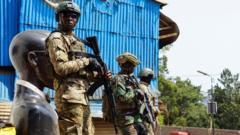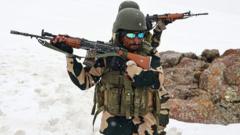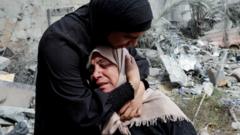**The leaders of the Democratic Republic of Congo and Rwanda have met in Qatar to negotiate an immediate ceasefire in eastern DR Congo, following increased violence attributed to M23 rebels supported by Rwanda.**
**Ceasefire Called by DR Congo and Rwanda in Qatar Negotiations**

**Ceasefire Called by DR Congo and Rwanda in Qatar Negotiations**
**Tensions rise as leaders push for dialogue amid escalating M23 conflict**
In a significant diplomatic move, the Presidents of the Democratic Republic of Congo (DR Congo), Félix Tshisekedi, and Rwanda, Paul Kagame, convened in Qatar to advocate for an "immediate ceasefire" in the ongoing conflict in eastern DR Congo. This meeting marks the first face-to-face interaction between the two leaders since the M23 rebel group, said to be backed by Rwanda, intensified military offenses in the region, resulting in over 7,000 fatalities since January.
While the call for a ceasefire has been made, there remains skepticism regarding whether the M23 will comply, especially after the rebels opted not to join peace discussions in Angola earlier this week. Tensions have escalated as DR Congo accuses Rwanda of equipping the M23 and deploying troops in support of the insurgents, an allegation that Rwanda adamantly refutes, claiming its military efforts are purely defensive against the Congolese army and associated militias.
Moreover, Rwanda is also accused of unlawfully extracting mineral resources in DR Congo’s eastern territories, which it deny. Previous peace initiatives, including talks last December facilitated by Angola, have faltered after Rwanda insisted on direct negotiations between the Congolese government and the M23, subsequently allowing the rebels to make rapid territorial gains, overtaking strategic cities like Goma and Bukavu.
According to a statement from Qatar’s Foreign Ministry, the leadership has expressed a desire for an "immediate and unconditional" ceasefire, although clarification on enforcement and monitoring mechanisms remains elusive. Both presidents acknowledged the need to further their discussions initiated in Doha to lay the groundwork for lasting peace, despite their historically antagonistic public exchanges.
This meeting, viewed as a promising step towards reconciliation, was arranged following initiatives led by Qatar’s Emir, Sheikh Tamim bin Hamad Al Thani, highlighting the Gulf nation’s strategic role as a facilitator in African conflicts. The position of the Congolese government reflects optimism for sustained dialogue, suggesting that this summit could pave the way for subsequent talks, especially after a previous peace effort suffered setbacks due to sanctions levied by the European Union against M23 leadership.
As the international community watches closely, the prospect of peace in the war-torn eastern DR Congo hangs in the balance, relying heavily on the willingness of all parties involved to engage in genuine negotiations.
While the call for a ceasefire has been made, there remains skepticism regarding whether the M23 will comply, especially after the rebels opted not to join peace discussions in Angola earlier this week. Tensions have escalated as DR Congo accuses Rwanda of equipping the M23 and deploying troops in support of the insurgents, an allegation that Rwanda adamantly refutes, claiming its military efforts are purely defensive against the Congolese army and associated militias.
Moreover, Rwanda is also accused of unlawfully extracting mineral resources in DR Congo’s eastern territories, which it deny. Previous peace initiatives, including talks last December facilitated by Angola, have faltered after Rwanda insisted on direct negotiations between the Congolese government and the M23, subsequently allowing the rebels to make rapid territorial gains, overtaking strategic cities like Goma and Bukavu.
According to a statement from Qatar’s Foreign Ministry, the leadership has expressed a desire for an "immediate and unconditional" ceasefire, although clarification on enforcement and monitoring mechanisms remains elusive. Both presidents acknowledged the need to further their discussions initiated in Doha to lay the groundwork for lasting peace, despite their historically antagonistic public exchanges.
This meeting, viewed as a promising step towards reconciliation, was arranged following initiatives led by Qatar’s Emir, Sheikh Tamim bin Hamad Al Thani, highlighting the Gulf nation’s strategic role as a facilitator in African conflicts. The position of the Congolese government reflects optimism for sustained dialogue, suggesting that this summit could pave the way for subsequent talks, especially after a previous peace effort suffered setbacks due to sanctions levied by the European Union against M23 leadership.
As the international community watches closely, the prospect of peace in the war-torn eastern DR Congo hangs in the balance, relying heavily on the willingness of all parties involved to engage in genuine negotiations.




















